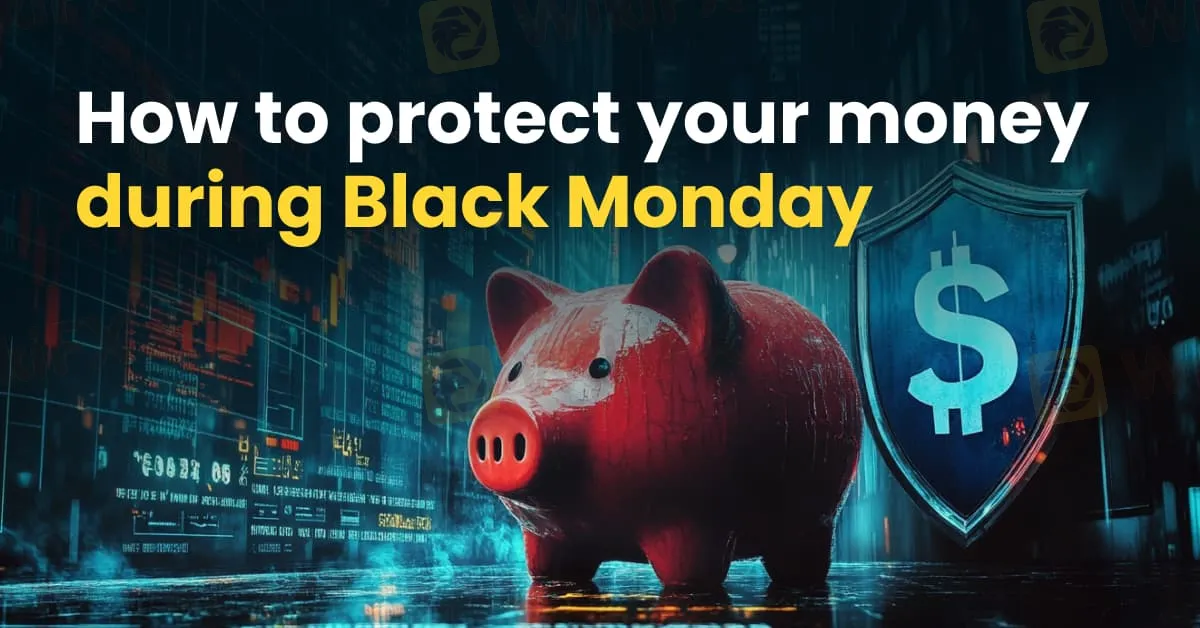How to protect your money during Black Monday
Abstract:Black Monday—the day when markets crashed and panic selling took over—reminds us that economic downturns are part of the investing cycle. While such days can trigger fear and uncertainty, being prepared with a well-planned strategy can help protect your hard-earned money. In this article, we’ll explore actionable tips on safeguarding your investments and overall finances during a market crash.

Introduction
Black Monday—the day when markets crashed and panic selling took over—reminds us that economic downturns are part of the investing cycle. While such days can trigger fear and uncertainty, being prepared with a well-planned strategy can help protect your hard-earned money. In this article, well explore actionable tips on safeguarding your investments and overall finances during a market crash.
1. Stay Calm and Avoid Panic Selling
- Understand the Cycle: Remember, market declines are natural. Historical data shows that even the worst market crashes eventually recover.
- Stick to Your Plan: Selling in a panic locks in losses. Instead, maintain a long-term perspective and stick to your diversified portfolio strategy.
- Emotional Management: Practice mindfulness and avoid checking your portfolio obsessively during volatile days.
2. Diversify Your Portfolio
- Spread Your Risk: Ensure that youre not overly concentrated in one asset class or sector. Diversification across stocks, bonds, and alternative investments can cushion your portfolio from severe downturns.
- Consider Defensive Sectors: During market crashes, stocks in consumer staples, healthcare, and utilities tend to be more resilient.
- Geographical Diversification: International exposure can reduce risk if one market experiences a severe downturn.
3. Keep a Cash Reserve
- Emergency Fund: Have three to six months worth of living expenses in a high-yield savings account.
- Opportunistic Buying: Holding cash enables you to “buy the dip” when quality investments are available at lower prices.
- Liquidity: Cash is your safety net, ensuring youre not forced to sell other assets during a downturn.
4. Hedge Your Investments
- Options Strategies: Consider buying put options on your investments as an insurance policy against a steep decline.
- Stop-Loss Orders: These can automatically sell stocks when prices drop below a predetermined level, limiting potential losses.
- Portfolio Insurance: Use strategies like dynamic hedging to maintain a targeted balance between risk and reward.
5. Revisit and Rebalance Your Portfolio
- Periodic Review: Regularly check your asset allocation. Rebalancing helps maintain your risk profile and ensures youre not overexposed to one area.
- Adjust for Volatility: If certain investments fall significantly, consider buying additional shares to average down your cost basis.
- Long-Term Strategy: A disciplined rebalancing approach can help you capture gains when the market eventually recovers.
Conclusion
Black Monday may be a stark reminder of market volatility, but it doesnt have to spell disaster for your financial future. By staying calm, diversifying your investments, maintaining cash reserves, hedging appropriately, and rebalancing your portfolio, you can protect your money during market crashes and position yourself to benefit when the market recovers. Remember, the key is not to make impulsive decisions based on short-term market noise but to remain focused on your long-term financial goals.

Read more

Broker Comparsion: FXTM vs AvaTrade
FXTM and AvaTrade are two well-established online brokers offering forex and CFD trading across global markets. Both enjoy strong reputations and high ratings on WikiFX—FXTM holds an AAA overall rating, while AvaTrade scores 9.49/10, indicating they’re regarded as reliable choices by the community. However, since brokers have great reputation in the industry, how do we know which one is more suitable for individuals to invest in? Today's article is about the comparison between FXTM and AvaTrade.

Shocking Move: Yen Breaks Past 140 Barrier!
The yen's breakout above the 140 mark has caught global attention, and the reasons behind it are more than technical.

FINRA fines SpeedRoute for alleged rule violations
The Financial Industry Regulatory Authority (FINRA) has imposed a $300,000 fine on SpeedRoute LLC for a series of supervisory, risk management, and anti-money laundering (AML) program deficiencies spanning from 2017 to the present. Of this amount, $75,000 is payable to FINRA, with the remainder offset by SpeedRoute’s limited ability to pay. In addition to the monetary penalty, SpeedRoute has been censured and ordered to overhaul its compliance framework, including enhancing its written supervisory procedures (WSPs) for market access controls and strengthening its AML program.

Nigeria's Oil Crisis: How Are Stakeholders Responding?
Despite being rich in oil, Nigeria struggles with refining shortages. What’s behind this paradox, and how are different actors reacting?
WikiFX Broker
Latest News
Love, Investment & Lies: Online Date Turned into a RM103,000 Scam
Broker Took 10% of User's Profits – New Way to Swindle You? Beware!
Pi Network: Scam Allegations Spark Heated Debate
Broker Comparsion: FXTM vs AvaTrade
Account Deleted, Funds Gone: A New Broker Tactic to Beware Of?
Broker’s Promise Turns to Loss – Funds Disappear, No Compensation!
StoneX Subsidiary, Gain Global Markets Bermuda, Penalized for Trading Misconduct
El Salvador and U.S. Launch Cross-Border Crypto Regulatory Sandbox
The Instagram Promise That Stole RM33,000
Coinbase Launches Bitcoin Yield Fund for Institutional Investors
Rate Calc
